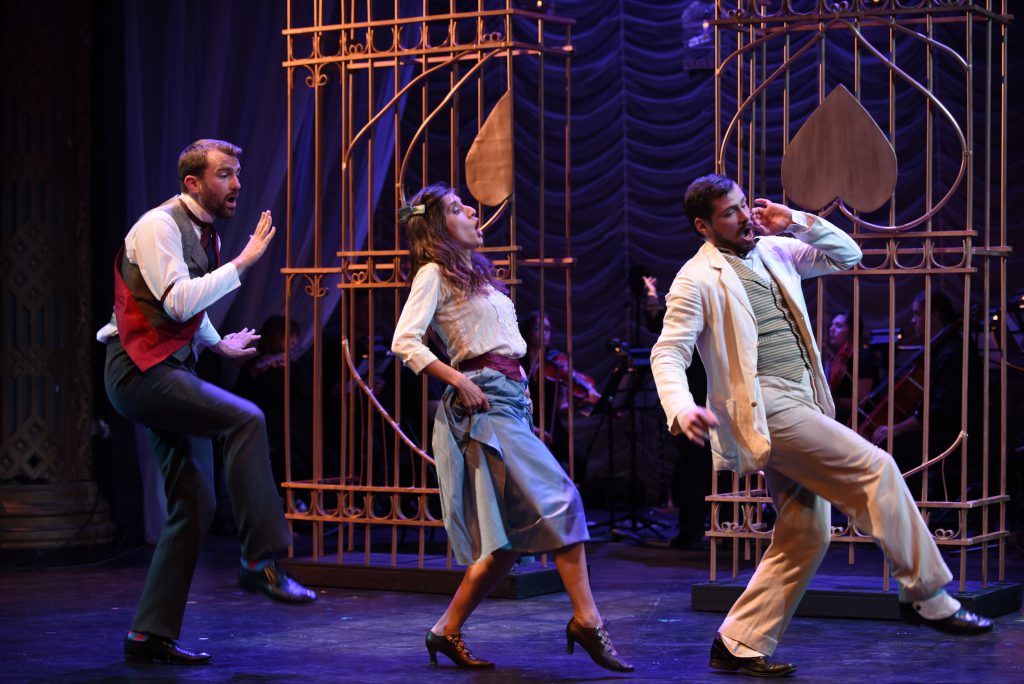The dashing Count Almaviva Rossini knew bore scant resemblance to the brooding, middle-aged lothario Mozart had encountered some 30 years earlier, the latter having elected to tap episode two of playwright Pierre Beaumarchais’ Enlightenment saga for operatic inspiration. Presented as a much younger man in the Italian maestro’s 19th century bel canto comedy, the serenading, ladder-climbing, anti-establishment rule breaker of Il barbiere di Siviglia bore little if any sign of the serial sexual predator he would become. Centering the action in a nouveau riche townhouse in cash-obsessed Seville versus Le nozze di Figaro’s rambling ancestral country villa, Rossini and librettist Cesare Sterbini actively rewound the theatrical clock. Gone was any overt foreshadowing of Lorenzo Da Ponte’s savage assault on a corrupt, decaying Ancien Régime where the notion of droit du seigneur was anything but laughable. All was charm and romance in the Rossini/Sterbini portrait of aristocratic power and privilege. At first glance.
Barbiere was born in an age of disillusionment. The French Revolution had failed to uphold its lofty promise of universal emancipation. Napoleon had left Europe shocked, shattered and imbalanced after more than a decade of savage continental war. Laughter may reign victorious in Rossini’s 1816 farce but an over-riding sense of skepticism and irony never quite dissipates.
Striking a brave blow on behalf of tradition while still managing to cast a goodly smattering of convention to the wind, Toronto’s plucky indie co-operative, Opera 5, announces its entry into the mainstream music marketplace with a hugely big-hearted, high-spirited Barbiere bubbling over with buffoonery. Helmed by artistic director Jessica Derventzis, the young, irrepressible cast of uniformly excellent singer actors mines virtually every seam of Rossinian chaos and confusion, extracting a wealth of outrageous operatic burlesque.
Il barbiere di Siviglia, lowbrow buffa rendered irresistible, has an impeccable pedigree. Many, if not most, of the principals are derived from the commedia dell’arte — a riot of broad, laughable antique types. The sly, manipulative servant. The sharp-tongued old woman. The swooning noble lovers. Stock personalities afforded instant recognition, blunt slapstick, a timeless comedic device elevated to near art form status by Derventzis and company, boosting action to the level of anarchy. Nothing quite so gratifies as a spectacularly silly walk or a perfect spit take executed through a mouthful of shaving foam. The past is well and truly present in this keenly observed Barbiere di Siviglia. But there are fresh perspectives at play here, as well.
Presented in its entirety with English surtitles, Opera 5’s crisp, snappy Il barbiere di Siviglia crackles with inventiveness, part intimate chamber opera, part showbiz extravaganza. Production designer Erin Frances Gerofsky’s shrewd, modular set — a series of striking, vaguely Art Nouveau gilded cages — complimented by lighting designer Jennifer Lennon’s vivid chiaroscuro make a potent metaphorical point. Fair Rosina is every bit the captive forever imprisoned in the shadows by her tyrannical guardian, her lavish dowry, a fiercely guarded prize.
Vecchio avaro e brontolone (“Stingy, grumbling old man”), world weary maid Berta remarks of contemptible ersatz father figure Don Bartolo, a role invariably interpreted as a that of a grasping schemer of advanced years. Baritone Jeremy Ludwig is decidedly cast from a different mould. The combination of commanding, athletic presence and youthful, dynamic voice drives the villainy of the piece that much deeper. And the comedic implications that much broader.
A perennial problem character historically by virtue of his bumbling muddle-mindedness, Barbiere’s resident heartthrob, Il Conte, a.k.a. Lindoro undergoes something of a similar casting transformation. Tenor Kevin Myers’ bright, confidant stylings and charismatic stage manners denote a very different sort of leading man, assertive yet vulnerable, an appealing match for the perpetually captivating Rosina.
Under the steady baton of music director Evan Mitchell, a taut, superbly disciplined 11-player ensemble populates virtually the entire rear of the company’s modest Factory Theatre playing area, becoming as much a feature of the production’s very active mise-en-scene as stagecraft or performance. The proximity of orchestra to singers, albeit dictated by the lack of a pit, gives this Barbiere, a unique, serendipitous sense of musical integration. The intense theatricality of Rossini’s highly illustrative score is thrown into the spotlight. The famed Act II storm scene with its blustery brass and woodwinds and turbulent strings is particularly evocative in close-up. No banda ever sounded quite this furious. Charged with sole responsibility for countless moments of finely filigreed recit as accompanist, acoustic guitarist Andrew Cloutier gifts us with some of the evening’s most enchanting music, continuo promoted to centre stage.
Appearing as Seville’s premier go-to barber, baritone Johnathon Kirby mugs and postures with a glorious lack of shame, endlessly energetic with more than a touch of heroism residing at the top of his sweeping range. Gifted with infallible technique and an unerring sense of comic timing, Kirby ignites the evening’s vocal fireworks with a sizzling Largo al factotum that leaves listeners cheering.
Mezzo-soprano Stephanie Tritchew appears as Rosina, singing with great warmth and luminosity, strength and centeredness. Rossini’s glorious Una voce poco fa (“The voice I heard just now”) is given gorgeous expression, but it is her tripping, double quick coloratura duet with Figaro, Dunque io son (“Then it is I”), that truly impresses. Together, Tritchew and Kirby dazzle.
Bass-baritone Giles Tomkins is an outrageously louche Don Basilio, advisor to Bartolo in all matters scandalous. Soprano Megan Miceli is bustling, exasperated Berta, the maid. Danlie Rae Acebuque is the Count’s slippery, sly servant Fiorello. Tenors Arieh Sacke and Lee Clapp and Bass Wesley Hui perform in a seeming infinity of roles as attention-grabbing comprimari and choristers.
Il barbiere di Siviglia, as witnessed by Opera 5, breathes new life into the venerable classic. Inhale deeply. The experience is revitalizing.
Last performance, Sunday, June 17, 2:00 PM
* * *
Above: Kevin Myers as Il Conte D’Almaviva, Stephanie Tritchew as Rosina, Johnathon Kirby as Figaro. Photo by Emily Ding Photography


